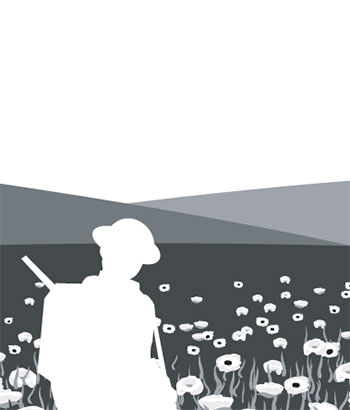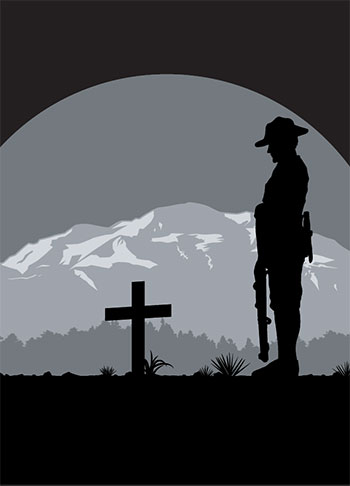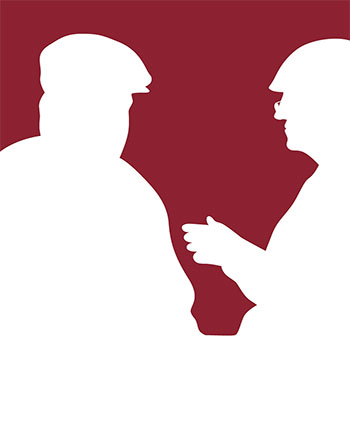Back to series



Hope in the Midst of the Storm
VOLUME 5 NUMBER 1 ISSUE OF BROADCAST TALKS (PDF)
BROADCAST TALKS presents ideas to cultivate Christ-like thinking and living. Each issue features a transcription of a talk presented at an event of The C. S. Lewis Institute. The following is adapted from a talk given at the C.S. Lewis Institute’s Annual Fundraising Banquet, Hope in the Midst of the Storm April 4, 2019, at the Fairview Park Marriott in Falls Church, Virginia.
|
Beginning at 7 a.m., July 1, 1916, the British Army unleashes what can only be called a hellish assault against German positions on the western front in France, along the River Somme, crossing no-man’s land, that dreadful dead zone that stretches between enemy camps. It’ll be a song, the soldiers are told. And so at 7:30 a.m. on the opening day of the battle of Somme, nearly a hundred thousand British troops, to the sounds of whistles, drums, bagpipes, climb out of their trenches and attack. What they don’t know is that the Germans have endured the pounding, and they’re waiting, guns poised, for the British infantry. “We didn’t have to aim,” said a German machine-gunner, “we just fired into them.” Before the day was over, 19,204 British soldiers lay dead and nearly twice that number wounded. July 1, 1916 marks the deadliest single day in British military history, and, if you think about it, that’s a lot of military history. Twenty-four-year-old John Ronald Reuel Tolkien, J.R.R. Tolkien, a second-lieutenant in the British expeditionary force, spent several months in the trenches in the Somme valley, often under intense enemy fire. In the throes of war with the smell of death all about him, it is here, Tolkien explained later, that he began writing the early parts of his mythology about Middle-earth: at lectures in cold fogs, he says, or by candle light, even some down in dugouts under shellfire. It’s during this period that Tolkien conceives the story of the fall of Gondolin, the tale of how the elven city of Gondolin is betrayed into the hands of Morgoth. Here’s what he wrote:
While Tolkien is enduring the horror of the trenches, another young man with a gift for storytelling is hoping in vain that he can avoid the conflict altogether. Clive Staples Lewis, C.S. Lewis, finds himself in a combat regiment on the western front. November 1917, he arrives in France as a second-lieutenant on his nineteenth birthday. Think about what you were doing on your nineteenth birthday, ladies and gentlemen. We weren’t in trenches, I’m sure. Well, after five months of combat, Lewis has had enough of war, what he described as the frights, the cold, the smell of high explosive, the horribly smashed men still moving like half-crushed beetles. His poetry during this period rails against the silent, uncaring heaven. Here are a few lines from Lewis:
That’s C.S. Lewis in 1917. He went into the war as an atheist, he comes out of the war as an atheist. He’s an atheist in a foxhole! Eventually, he will abandon his skepticism and he’ll become a Christian, thanks in no small way to J.R.R. Tolkien. Both men survive the war. Tolkien contracts trench fever, and he’s taken out of harm’s way. Lewis is severely injured in a mortar attack that kills his sergeant who was standing nearby. Lewis is sent to a hospital in London to recover from his wounds. The two men meet for the first time in 1926 at Oxford University, both as instructors in English literature, and they soon realize they have a shared love of mythologies, stories about a great quest. Listen to what Lewis said about an early meeting with Tolkien, one night in his rooms at Magdalene College around 1929. Writing to a friend, Lewis said,
So this bond of friendship is being established that’s going to transform their lives and their literary careers. Together they will use their personal experience of combat to inform their Christian imagination. They’ll enlist the hardships of war as a crucible for moral and spiritual growth like no other writers of their day. They will retrieve the concept of the epic and mythic hero and reinvent them for the modern mind. And what’s the result? The Hobbit, The Lord of the Rings, Mere Christianity, The Screwtape Letters, The Chronicles of Narnia. War, friendship, and imagination. That’s the big picture. War, friendship, and imagination. Remember what the soldiers of the western front were made to endure: the mortars, the machine-guns, the tanks, the poison gas, the flame-throwers, the barbed wire, the trench warfare. Never before had technology and science so conspired to obliterate both man and nature. The mutilated remains of millions of men—farmers, factory workers, clerks — are consigned to graves scattered across Europe, and all for what? For what? Who can believe in heroism or valor or virtue in the face of that? That is the mood of the hour, friends. Lewis and Tolkien, though, completely reject this attitude. In the worlds they create, everyone has a role to play in an epic battle between light and darkness. “Such is the course of deeds that move the wheels of the world,” writes Tolkien. “Small hands do them as because they must, while the eyes of the great are elsewhere.” In Lewis’s The Chronicles of Narnia, we follow the adventures of the Pevensie children as they become part of a great war for the kingdom of Narnia against the White Witch and her forces of evil. Have we got any Lucy fans out there? Remember Lucy and Prince Caspian? There’s that moment of crisis when the outcome of the war is hanging in the balance, and this little girl is asked to do something that is difficult for her. Something that could be costly. Something she doesn’t want to do. And she has to decide if she will put away her fears and obey Aslan. “I mustn’t think about it. I must just do it.” She could feel lion-strength going into her. “Now you are a lioness,” Aslan said. “And now all Narnia will be renewed.” In the conflict between the White Witch and Narnia, between Mordor and Middle-earth, every soul is tested. Every creature must choose sides. Moral indifference is never an option. In The Lord of the Rings, the mission of little Frodo Baggins is to carry the ring of power to the fires of Mount Doom, right? Destroy it before it can destroy him. What is the defining quality of the hobbit — physical quality, defining quality? Short! He’s small, that’s right! “I’m not made for perilous quests,” Frodo exclaims. “Why was I chosen?” “You may be sure that it was not for any merit that others do not possess,” replies Gandalf. “Not for power or wisdom at any rate, but you have been chosen and you must therefore use such strength and heart and wits as you have.” Here again, friends, Tolkien’s experience at the Somme worked on his imagination. Where did Tolkien get the idea for his hobbits in the first place? Well, after he became a professor at Oxford, he’s sitting and grading student papers. Are there any teachers out there in the audience? How many of you teachers really enjoy grading student papers? You can’t possibly enjoy it. Tolkien doesn’t enjoy it either, and he finds a blank sheet of paper. Finally, a sense of relief, and he scrawls on the blank sheet of paper these words: “In a hole in the ground there lived a hobbit.” Later on, Tolkien reflected, “Eventually I thought I’d better find out what hobbits were like.” Well, we know what hobbits are like, don’t we? Listen to Tolkien: “I’ve always been impressed that we’re here surviving because of the indomitable courage of quite small people against impossible odds,” he says. “The hobbits were made small,” he explained, “to show up in creatures of very small physical power the amazing and unexpected heroism of ordinary men at a pinch.” Tolkien is talking about the men whom he fought alongside in the trenches in France. They were not for the most part a professional army. They were citizen-soldiers — shopkeepers, bartenders, doctors, farmers, fishermen. Listen to Tolkien: “My Sam Gamgee is indeed a reflection of the English soldier, of the privates… that I knew in the 1914 war, and recognized as so far superior to myself.” Well, one of the most beloved characters in fiction is based on the ordinary English soldier at his post doing his duty regardless of the costs.
Why friendship? I believe that their personal knowledge of the fellowship of men under fire must rank as a defining experience of their literary lives. The theme of friendship, if you think about it, pulses through each of the Narnian stories, like a force of nature. Is it surprising that the cords of friendship, tested and strengthened amid the suffering of war, is one of the great themes of The Lord of the Rings? Think about it. When Frodo arrives at Crickhollow before setting out into the old forest, he’s determined to leave on his own. But Merry, Pippin, and Sam get wise to his plans, and they confront him before he can slip away. They insist on coming with him. Frodo protests, “But it does not seem I can trust anyone.” Merry is unflappable:
Well, there’s a question for all of us. Do we have a few people in our lives who are following us like hounds? Loyalty in the crisis moment. It’s one of the qualities of men in battle. Caught up in youth in the horrors of war, Lewis and Tolkien could never forget its sorrows, but neither do they succumb to its despair as so many men did in the post-war years. I think the friendship that they deliberately pursued with each other over the course of their lives is a huge part of the reason. And out of their relationship comes something profoundly creative and ennobling: war, friendship, and imagination. o after the war, I think they seek to recapture something like the intense comradeship that sustained them during those crisis years of 1914–1918. At Oxford, they launched the Inklings, right? Those who dabble in ink. The group of friends and fellow scholars, most of them Christians, who meet weekly. They meet for nearly twenty years, every week. They gather to read aloud and to critique one another’s works. Wouldn’t you love to have been in the room there with those Inklings? Listen to Lewis: “Theoretically, to talk about literature,” he says, “but in fact, nearly always to talk about something better.” It is this community of friends that Lewis has in mind when he writes these unforgettable words in his book The Four Loves: Something happens
“Life” he says, “natural life… has no better gift to give. Who could have deserved it?” The unique relationship between Tolkien and Lewis must rank as one of the most consequential friendships of the twentieth century, when you think about the influence these guys have had. Both authors were deeply unsatisfied with the works of fiction being produced in the post-war years. They challenged each other to do something about it. “If they won’t write the kind of books we want to read,” Lewis tells his friend, “we shall have to write them ourselves.” Tolkien begins to work on a sequel to The Hobbit. Lewis writes Out of the Silent Planet, the first of his space trilogy. But the fruit of their relationship is much richer than this. Lewis was an agnostic when he first met Tolkien in 1926. But Tolkien’s Catholic Christian faith, his immense intelligence, their shared love of epic medieval literature, all of this has a profound effect on Lewis. It is Tolkien’s conversation with Lewis on that night of September 19, 1931: They talk until three o’clock in the morning about the nature of myth and about Christianity as the myth that became fact. It is that conversation that Lewis describes as the immediate human cause of his conversion to Christianity. Tolkien helps to unlock a door into Lewis’s mind, and truth and light flood in. Lewis becomes for Tolkien his great advocate for pursuing his hobbit trade, as they called it. Listen to Tolkien:
Wow! When Lewis learns that The Lord of the Rings has been accepted for publication, he writes a letter to Tolkien, and he expresses the sheer pleasure of looking forward to having the book to read and reread. And when I found this letter in my research, the hair stood up on the back of my neck because it’s such a revealing letter. Because in this letter Lewis reveals something of the importance of the book The Lord of the Rings to both of them. Here’s what he says, a bit of it: “So much of your whole life, so much of our joint life, so much of the war, so much that seemed to be slipping away… into the past, is now, in a sort made permanent.” Do you grasp what he is saying? Somehow Tolkien has captured something of their life’s journey together, with all of its struggles and joys. And it’s hidden, friends, it’s hidden in the pages of this great work. Here is a glimpse, just a glimpse, of what friendship can look like when it reaches for a high purpose and is watered by the streams of sacrifice and loyalty and love. And yet this friendship and creativity and beauty emerged from the catastrophe of war. Narnia and Middle-earth are the settings for great conflicts and great quests. Here are war stories, war stories wrapped in fantasy, that reveal ancient truths about the human condition. Tolkien and Lewis used the language of myth not to escape the world, but to suggest that real life has a mythic and heroic quality. And yet even this is not the whole of their achievement.
In Lewis’s Narnia, the crowning moment of grace occurs in The Last Battle, right? As King Tirian, the children, and a faithful remnant of Narnians fight their way to the entrance of the stable. The last battle of the last king of Narnia. Spoiler alert! We are led to believe that inside the stable is certain death. It’s the stronghold of an all-powerful evil. Remember the words from Poggin, “I feel in my bones that we shall all, one by one, pass through that dark door before morning. I can think of a hundred deaths I would rather have died.” As the company is forced inside, all hope seems lost, and yet here again comes the joyous turn, because the Great Lion has invaded the stable, cast out the demon Tash, and turned the stable into a portal into Aslan’s country. For these two giants of literature, there’s really only one truth, one singular event that can end the long war against evil, undo the tragedy of the human condition, and bring lasting peace. It’s the return of the king. In Narnia, the king is Aslan, the Great Lion, the Christ figure. Only Aslan knows the way to that blessed realm that lies beyond the sea. Listen to Lewis: “The light ahead was growing stronger,” he writes. “Lucy saw that a great series of many-colored cliffs lit up in front of them like a giant’s staircase. And then she forgot everything else.” I love that line. “And then she forgot everything else, because Aslan himself was coming, leaping down from cliff to cliff like a living cataract of power and beauty.” This king comes in power and beauty, as the voice of conscience and as the source of consolation, as the lion and the lamb. In Tolkien’s story, the king is Aragorn. Aragorn, the chief epic hero of The Lord of the Rings, heir to the kingship of Gondor — his life is devoted to the war against Sauron. His true stature, though, is made known only after Sauron’s defeat when he finally assumes his throne. Here’s how Tolkien describes that moment:
Here is a world, friends, our world, in which every soul is caught up in an epic struggle against evil, a story of sacrifice and courage and clashing armies. The return of the King. It is in these works of fiction, these mythic tales of loss and recovery, of betrayal and redemption, that we find a clue to the meaning of our earthly journey. “Is everything sad going to come untrue?” asks Sam. For the creators of Narnia and Middle-earth here is the deepest source of hope for the human story. It’s the belief that God and Goodness are the ultimate realities, and that the shadow of sin and suffering will finally be lifted from our lives. The Great War will be won. This King who brings strength and healing in His hands will make everything sad come untrue. [A video of the complete version of this talk is available Here. Additional information about the topic of this talk is included in Joseph Loconte’s book, A Hobbit, a Wardrobe, and a Great War (Nashville: Nelson Books, 2015).]
|
|||
 |

Joseph Loconte
Associate ProfessorJoseph Loconte, Associate Professor, Ph.D., is Senior Fellow in Christianity and Culture at The King’s College and the Director of the Simon Center for American Studies at the Heritage Foundation in Washington, D.C. From 2009 to 2020. Mr. Loconte has a master’s degree from Wheaton College and earned his PhD in history at King’s College London, University of London. He is the author of several books, including: the New York Times bestseller A Hobbit, a Wardrobe, and a Great War: How J.R.R. Tolkien and C.S. Lewis Rediscovered Faith, Friendship, and Heroism in the Cataclysm of 1914-1918. He is currently at work on a documentary film based on his book A Hobbit, a Wardrobe, and a Great War.

 COPYRIGHT: This publication is published by C.S. Lewis Institute; 8001 Braddock Road, Suite 301; Springfield, VA 22151. Portions of the publication may be reproduced for noncommercial, local church or ministry use without prior permission. Electronic copies of the PDF files may be duplicated and transmitted via e-mail for personal and church use. Articles may not be modified without prior written permission of the Institute. For questions, contact the Institute: 703.914.5602 or email us.
COPYRIGHT: This publication is published by C.S. Lewis Institute; 8001 Braddock Road, Suite 301; Springfield, VA 22151. Portions of the publication may be reproduced for noncommercial, local church or ministry use without prior permission. Electronic copies of the PDF files may be duplicated and transmitted via e-mail for personal and church use. Articles may not be modified without prior written permission of the Institute. For questions, contact the Institute: 703.914.5602 or email us.
-
Recent Podcasts
Ralph Waldo Emerson’s Philosophy and Influence
by David George Moore on July 26, 2024Ralph Waldo Emerson was a gifted nineteenth century...Read More
-
The Side B Stories – Nate Sala’s Story
by Jana Harmon, Nate Sala on July 19, 2024
-
Terrorism Through the Eyes of Faith
by Dennis Hollinger on July 12, 2024
-
Recent Publications
Hasn’t Science Proven That Belief in God Is an Outdated Superstition?
by Sharon Dirckx on July 1, 2024Many assume that scientific practice and belief in...Read More
-
Has the Bible Been Corrupted as Some Muslims Claim?
by Andy Bannister on June 1, 2024
-
Seeing Jesus Through the Eyes of Women
by Rebecca McLaughlin on May 15, 2024
0
All Booked
0.00
All Booked
0.00
All Booked
22194
C.S. Lewis’s The Abolition of Man Live Online Small Group 8:00 PM ET
https://www.cslewisinstitute.org/?event=c-s-lewiss-the-abolition-of-man-study-course&event_date=2024-10-02®=1
https://www.paypal.com/cgi-bin/webscr
2024-10-02

Next coming event
Days
Hours
Minutes
Seconds
C.S. Lewis’s The Abolition of Man Live Online Small Group 8:00 PM ET
On October 2, 2024 at 8:00 pmCategories
Speakers

Joseph Loconte
Associate Professor
Team Members

Joseph Loconte
Associate ProfessorJoseph Loconte, Associate Professor, Ph.D., is Senior Fellow in Christianity and Culture at The King’s College and the Director of the Simon Center for American Studies at the Heritage Foundation in Washington, D.C. From 2009 to 2020. Mr. Loconte has a master’s degree from Wheaton College and earned his PhD in history at King’s College London, University of London. He is the author of several books, including: the New York Times bestseller A Hobbit, a Wardrobe, and a Great War: How J.R.R. Tolkien and C.S. Lewis Rediscovered Faith, Friendship, and Heroism in the Cataclysm of 1914-1918. He is currently at work on a documentary film based on his book A Hobbit, a Wardrobe, and a Great War.



 Tolkien called this the first real story of his imaginary world. He’s talking about the war for Middle-earth. He’s laying a foundation for his great epic work while he’s under fire.
Tolkien called this the first real story of his imaginary world. He’s talking about the war for Middle-earth. He’s laying a foundation for his great epic work while he’s under fire. Lewis and Tolkien share this fundamental moral vision: the belief that the choices of every person matter. And our choices matter because we’re all caught up in a great moral contest, a spiritual struggle against evil in the storms of life. How can we persevere through these storms? How do we persevere? According to Lewis and Tolkien, through friendship and faith.
Lewis and Tolkien share this fundamental moral vision: the belief that the choices of every person matter. And our choices matter because we’re all caught up in a great moral contest, a spiritual struggle against evil in the storms of life. How can we persevere through these storms? How do we persevere? According to Lewis and Tolkien, through friendship and faith. The friendship between Tolkien and Lewis, I believe, gave them the fortitude and the faith to challenge the culture of doubt and disillusionment that threatened to overshadow everything. They reinforced within each other their belief that the struggle against darkness is possible only because there’s a source of grace and goodness outside of ourselves. Think about it. By the end of his quest, Frodo the ring-bearer has given up the thought of ultimate success or even survival. “Hope fails,” he says. “An end comes,” he tells Sam. “We have only a little time to wait now. We’re lost in ruin and downfall, and there is no escape.” At the climax of his journey, at the fires of Mount Doom, despite all of his courage and strength, Frodo fails in his quest. He fails. He chooses not to destroy the ring but instead succumbs to its power and places it once again on his finger. Remember what he says. “I do not now choose to do what I came to do… The Ring is mine.” The hero cannot by his own efforts prevail in this war against evil, because the forces arrayed against him as well as the darkness within make victory impossible. And so the mythic dimension of their stories reaches its zenith. Like the best fairy tales, they provide the consolation of the happy ending. The sudden joyous turn, as Tolkien called it, toward rescue and redemption. It’s the reversal of a catastrophe, what Tolkien called a eucatastrophe, a decisive act of grace that promises to overcome our guilt, restore what’s been lost, and set things right. And so it is that Gollum, driven by his lust to dominate, bites off Frodo’s finger that bears the ring, only to slip and plunge to his death into the fire. And so, yes, the ring is destroyed. Yes, but not by Frodo, not by the Fellowship, but by “a sudden and miraculous grace.”
The friendship between Tolkien and Lewis, I believe, gave them the fortitude and the faith to challenge the culture of doubt and disillusionment that threatened to overshadow everything. They reinforced within each other their belief that the struggle against darkness is possible only because there’s a source of grace and goodness outside of ourselves. Think about it. By the end of his quest, Frodo the ring-bearer has given up the thought of ultimate success or even survival. “Hope fails,” he says. “An end comes,” he tells Sam. “We have only a little time to wait now. We’re lost in ruin and downfall, and there is no escape.” At the climax of his journey, at the fires of Mount Doom, despite all of his courage and strength, Frodo fails in his quest. He fails. He chooses not to destroy the ring but instead succumbs to its power and places it once again on his finger. Remember what he says. “I do not now choose to do what I came to do… The Ring is mine.” The hero cannot by his own efforts prevail in this war against evil, because the forces arrayed against him as well as the darkness within make victory impossible. And so the mythic dimension of their stories reaches its zenith. Like the best fairy tales, they provide the consolation of the happy ending. The sudden joyous turn, as Tolkien called it, toward rescue and redemption. It’s the reversal of a catastrophe, what Tolkien called a eucatastrophe, a decisive act of grace that promises to overcome our guilt, restore what’s been lost, and set things right. And so it is that Gollum, driven by his lust to dominate, bites off Frodo’s finger that bears the ring, only to slip and plunge to his death into the fire. And so, yes, the ring is destroyed. Yes, but not by Frodo, not by the Fellowship, but by “a sudden and miraculous grace.”

